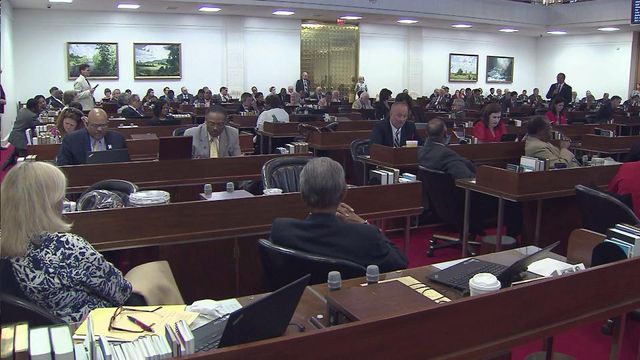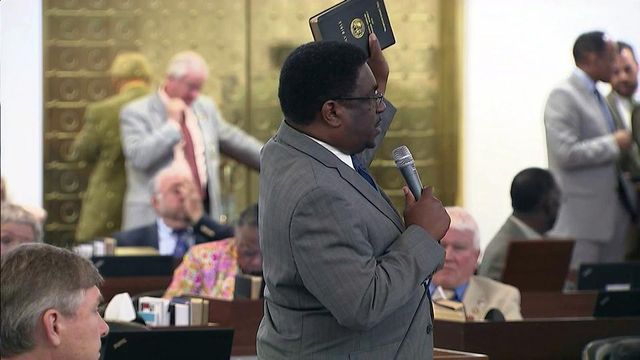Amid religious debate, House approves magistrate recusal bill
After a lengthy and heated debate on religion and same-sex marriage, House lawmakers gave tentative approval Wednesday to a bill allowing magistrates to refuse to perform marriages for religious reasons.
Posted — UpdatedSenate Bill 2 would allow magistrates and employees of county register of deeds offices who object to same-sex marriage to recuse themselves from performing or recording any marriages, gay or straight, for a period of at least six months.
If all magistrates in a county recuse themselves from performing marriages, then the chief judge must request an outside magistrate or perform the marriages himself or herself. Similarly, if all employees of a register of deeds office recuse themselves, the elected register must issue marriage licenses.
The bill also specifies that civil marriages must be available in every county at least 10 hours a week, spread out over three business days. Currently, there is no minimum time set in state law, so the availability of civil marriage varies widely from one county to the next.
House sponsor Rep. Dean Arp, R-Union, said the bill "provides a delicate balance” between magistrates’ rights to freedom of religion and the law.
"It is not discriminatory at all," Arp said. "It ensures the civil ceremonies will be performed.
"This is exactly what’s required by the Constitution of the United States, our state constitution and several federal statutes, even," he said.
Arp said the bill was prompted by an opinion last year from the state's Administrative Office of the Courts after North Carolina's constitutional ban on same-sex marriage was thrown out by a federal judge as discriminatory, a decision that Arp said "transgressed the will of the people."
The AOC directed magistrates to perform same-sex marriages if requested and warned that refusal to do so could result in disciplinary action or firing.
"The magistrates didn’t change the law. The law was changed on them," Arp said.
Since that order, eight magistrates in the state have left their positions, Arp said, and some have filed suit against the state. The legislation would allow them to seek reappointment to their former positions.
Critics of the measure pointed out that the bill doesn't specify when a magistrate must declare his or her recusal. A magistrate could marry a heterosexual couple but then could refuse to marry the same-sex couple in line behind them by recusing himself or herself on the spot.
"The same-sex couple pays exactly the same taxes to support that magistrate’s salary as a heterosexual couple, and they do have the right to expect the same service," argued Rep. Grier Martin, D-Wake.
"We’re creating a situation where people can discriminate against other members of our society at their discretion and not be disciplined," added Rep. Larry Hall, D-Durham. "Certain people have full rights that they vote for and pay for, and other people don’t have those same full rights to treatment on an equal basis."
Rep. Leo Daughtry, R-Johnston, conceded that the same-sex couple in that situation may have to wait longer to be married.
"It’s not like they are being turned down," Daughtry added. "As I understand it, there are times."
Arp compared the scenario to trying to get construction plans approved.
"You can’t demand the government responds and meets your needs at the moment that you ask," he said. "I wish we were at that point, but we’re not.”
Rep. Dan Bishop, R-Mecklenburg, compared the exemption to conscientious objectors in the military, but Martin argued that the two are dissimilar. To qualify as a conscientious objector, a person must object to all warfare, not to a particular conflict, and that must be determined through an in-depth investigation by military officers, Martin said.
"You do not get to pick and choose who you serve, you do not get to pick and choose your wars, and we should not allow our magistrates to pick and choose which citizens they are and are not going to marry," he said. "That magistrate's salary is being paid by all North Carolinians equally."
Rep. Sarah Stevens, R-Surry, argued that magistrates aren't the only option because individuals can go online and pay for a minister's license to marry couples.
"It’s not going to be an issue that these people can’t get married," Stevens said.
Rep. Kelly Alexander, D-Mecklenburg, compared the measure to the 1976 refusal by a Forsyth County magistrate to marry an interracial couple on religious grounds.
"The magistrate was eventually told you can’t refuse to marry people based on race, regardless of how deep your religious belief was," he recounted. "This is just a modernization of that thought process, a way to recreate the old Jim Crow era. In a sense, we’re about to create a class of Jim Crow magistrates."
Rep. Larry Pittman, R-Cabarrus, said the measure protects government officials from being forced to be "traitors against the kingdom of God" by taking part in same-sex marriage, which he described as "perverted and morally unconscionable."
"God created and defined marriage as between a man and a woman, and no country and no government, no court, no government entity, I believe, has the right to change it or to coerce anyone to disobey God in regard to it," Pittman said. "We need to stop worrying about what other nations or corporations think of us or where we stand and what our reputation is with them, and get back to caring what our reputation is in the sight of God."
Rep. Garland Pierce, D-Scotland, who is a Baptist minister, said the debate got "real preachy" at points, and several Democrats took exception to some lawmakers questioning their faith because they dislike the bill.
“I know discrimination, and I know religious practice,” Pierce said. “This is a form of discrimination."
“There’s a difference between what God intends and what God allows,” said Rep. Marvin Lucas, D-Cumberland.
Lucas urged magistrates who cannot uphold the Constitution in carrying out their duties to do “the honorable thing” and resign.
Rep. Paul Stam, R-Wake, said the debate should be more about employment discrimination and laws governing that than about religion. Judges or prosecutors who oppose the death penalty wouldn’t be fired, he said, but instead would be assigned to other duties than handling capital cases. The same should apply to magistrates, he said.
“This is easy to accommodate, but our foolish AOC refused to accommodate it. So, we have to do it,” Stam said.
"Marriage is not necessarily a right," said Rep. Bert Jones, R-Rockingham, citing state law that bans relatives who love each other from marrying. "We don't allow that. Yet. That'll be the next thing."
"It is the goal of the secular left to destroy the family and destroy the institution of marriage," Jones added. "Liberty is not just doing whatever you want."
"I believe in my heart that as we're moving further and further away from God and his word, that we can expect to see his blessings disappear," Jones warned.
“The left is the aggressor in these culture wars,” agreed Rep. John Blust, R-Guilford, who sponsored unsuccessful constitutional amendments to ban same-sex marriage each session for a decade before 2011. “It’s denigrated into some hatred or discrimination that someone doesn’t want to participate in a ceremony.”
Blust said the law could create problems in smaller counties that will need to be worked out, but that’s what happens when you have “legislation on the fly.”
“The courts came in and overturned 3,000 years of human experience,” he said.
Rep. Rick Glazier, D-Cumberland, pointed to the vote last weekend to legalize same-sex marriage in Ireland and a U.S. Supreme Court opinion on the issue, calling the bill "a legislative rear-guard action desperately seeking to fend off history."
"We got it wrong legally and morally when we put Amendment One on the ballot," Glazier said. "Today we have the chance to partially correct those mistakes and get it right."
Supporters say the proposal is constitutional because it will burden same-sex and heterosexual couples equally if neither can be married once a magistrate has opted out. But Glazier said the intent is "clearly discriminatory."
The legislation opens the door to refusal of any duty by any government official on religious grounds, he added, from a Catholic judge refusing to grant divorces to a border officer refusing to arrest illegal immigrants.
“The can of legal worms this bill opens up is reason enough to vote it down,” said Rep. John Ager, D-Buncombe, arguing that the bill doesn’t adequately define “sincerely held religious beliefs.”
The House will take a final vote on the measure Thursday. It will likely go then to the desk of Gov. Pat McCrory, who said in March he is opposed to the measure.
Although McCrory said shortly after the Senate approved the bill that he would not sign it, he has not answered repeated questions about whether he would veto it, leaving the possibility open that he could allow it to become law without his signature.
• Credits
Copyright 2024 by Capitol Broadcasting Company. All rights reserved. This material may not be published, broadcast, rewritten or redistributed.






